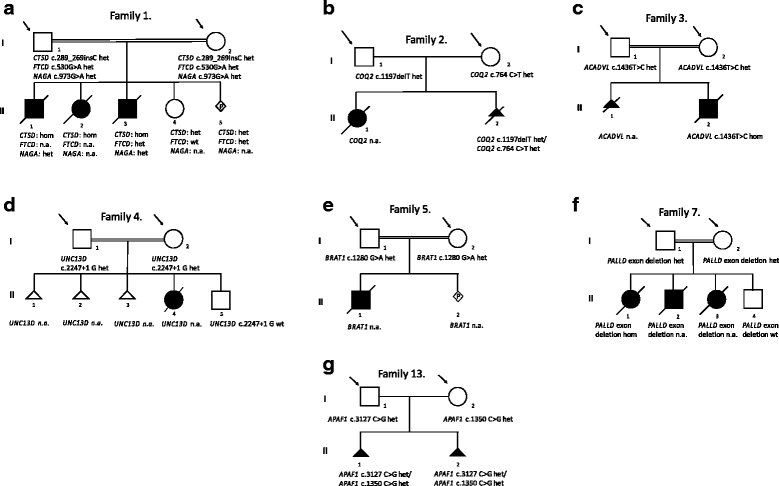Targeted next-generation sequencing analysis in couples at increased risk for autosomal recessive disorders
- PMID: 29373990
- PMCID: PMC5787287
- DOI: 10.1186/s13023-018-0763-0
Targeted next-generation sequencing analysis in couples at increased risk for autosomal recessive disorders
Abstract
Background: Many of the genetic childhood disorders leading to death in the pre- or neonatal period or during early childhood follow autosomal recessive modes of inheritance and bear specific challenges for genetic counseling and prenatal diagnostics. Parents are carriers but clinically unaffected, and diseases are rare but have recurrence risks of 25% in the same family. Often, affected children (or fetuses) die before a genetic diagnosis can be established, post-mortem analysis and phenotypic descriptions are insufficient and DNA from affected fetuses or children is not available for later analysis. A genetic diagnosis showing biallelic causative mutations is, however, the requirement for targeted carrier testing in parents and prenatal and preimplantation genetic diagnosis in further pregnancies.
Methods: We undertook targeted next-generation sequencing (NGS) for carrier screening of autosomal recessive lethal disorders in 8 consanguineous and 5 non-consanguineous couples with one or more affected children. We searched for heterozygous variants (non-synonymous coding or splice variants) in parents' DNA, using a set of 430 genes known to be causative for rare autosomal recessive diseases with poor prognosis, and then filtering for variants present in genes overlapping in both partners. Putative pathogenic variants were tested for cosegregation in affected fetuses or children where material was available.
Results: The diagnosis for the premature death in children was established in 5 of the 13 couples. Out of the 8 couples in which no causative diagnosis could be established 4 consented to undergo further analysis, in two of those a potentially causative variant in a novel candidate gene was identified.
Conclusions: For the families in whom causative variants could be identified, these may now be used for prenatal and preimplantation genetic diagnostics. Our data show that NGS based gene panel sequencing of selected genes involved in lethal autosomal recessive disorders is an effective tool for carrier screening in parents and for the identification of recessive gene defects and offers the possibility of prenatal and preimplantation genetic diagnosis in further pregnancies in families that have experienced deaths in early childhood and /or multiple abortions.
Keywords: autosomal recessive; carrier screening; consanguineous; next generation sequencing; panel diagnostics.
Conflict of interest statement
Ethics approval and consent to participate
This study adheres to the principles of the Helsinki Declaration and was carried out through routine diagnostic activity; formal ethics review was therefore not requested by our institutional ethical committee for the targeted next generation sequencing. Couples undergoing further analysis gave their written informed consent for participation in the study.
Consent for publication
All couples provided written informed consent for genetic testing and publication of clinical and genetic data according to the German bioethics laws.
Competing interests
The authors declare that they have no competing interests.
Publisher’s Note
Springer Nature remains neutral with regard to jurisdictional claims in published maps and institutional affiliations.
Figures

Similar articles
-
An exome sequencing strategy to diagnose lethal autosomal recessive disorders.Eur J Hum Genet. 2015 Mar;23(3):401-4. doi: 10.1038/ejhg.2014.120. Epub 2014 Jun 25. Eur J Hum Genet. 2015. PMID: 24961629 Free PMC article.
-
Application of next generation sequencing in genetic counseling a case of a couple at risk of cystinosis.BMC Med Genet. 2020 Dec 12;21(1):240. doi: 10.1186/s12881-020-01167-y. BMC Med Genet. 2020. PMID: 33308164 Free PMC article.
-
Diagnostic exome sequencing to elucidate the genetic basis of likely recessive disorders in consanguineous families.Hum Mutat. 2014 Oct;35(10):1203-10. doi: 10.1002/humu.22617. Epub 2014 Aug 18. Hum Mutat. 2014. PMID: 25044680
-
Contribution of Iran in Elucidating the Genetic Causes of Autosomal Recessive Intellectual Disability.Arch Iran Med. 2019 Aug 1;22(8):461-471. Arch Iran Med. 2019. PMID: 31679349 Review.
-
The application of next-generation sequencing in the autozygosity mapping of human recessive diseases.Hum Genet. 2013 Nov;132(11):1197-211. doi: 10.1007/s00439-013-1344-x. Epub 2013 Aug 2. Hum Genet. 2013. PMID: 23907654 Review.
Cited by
-
A capillary electrophoresis-based multiplex PCR assay for expanded carrier screening in the eastern Han Chinese population.NPJ Genom Med. 2022 Jan 25;7(1):6. doi: 10.1038/s41525-021-00280-y. NPJ Genom Med. 2022. PMID: 35079019 Free PMC article.
-
Use of expanded carrier screening for retrospective diagnosis of two deceased siblings with Van Maldergem syndrome 2: case report.Asian Biomed (Res Rev News). 2023 Aug 1;16(6):322-328. doi: 10.2478/abm-2022-0036. eCollection 2022 Dec. Asian Biomed (Res Rev News). 2023. PMID: 37551355 Free PMC article.
-
Opportunities and Challenges for Molecular Understanding of Ciliopathies-The 100,000 Genomes Project.Front Genet. 2019 Mar 11;10:127. doi: 10.3389/fgene.2019.00127. eCollection 2019. Front Genet. 2019. PMID: 30915099 Free PMC article. Review.
-
Whole Exome Sequencing Is the Minimal Technological Approach in Probands Born to Consanguineous Couples.Genes (Basel). 2021 Jun 24;12(7):962. doi: 10.3390/genes12070962. Genes (Basel). 2021. PMID: 34202629 Free PMC article.
References
MeSH terms
LinkOut - more resources
Full Text Sources
Other Literature Sources

